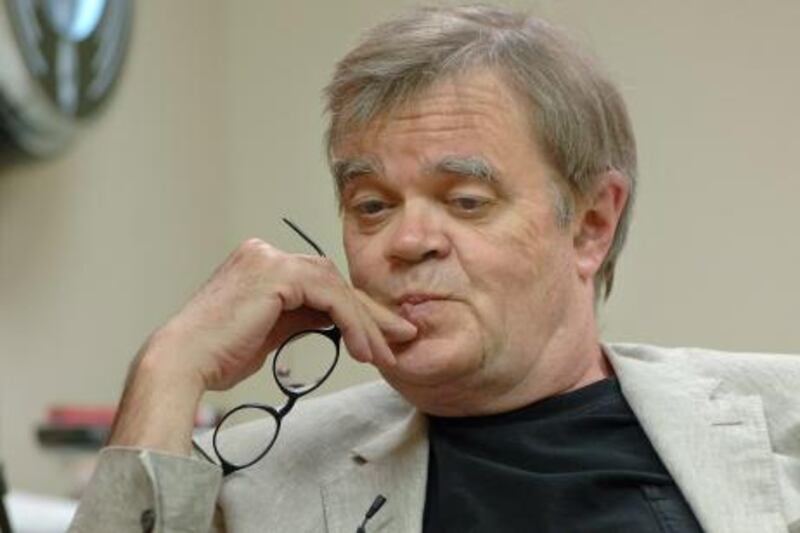Slowly but surely, the grand old voices of American broadcasting are fading into memory. Newscaster Walter Cronkite, often called "the most trusted man in America", died in 2009. Chat show host Larry King has been replaced by the Briton Piers Morgan. And this month, Garrison Keillor, best known for his weekly radio programme A Prairie Home Companion, announced that he will retire from his show when he reaches his 70th birthday in 2013.
The news caused quite a stir - and not just in the United States, where he regularly draws four million listeners a week. Keillor's show, which was first broadcast in 1971, possesses many of the staples of the variety show, with its musical interludes, comic skits and fake commercials. Last Saturday featured tenor Raul Melo and a message from his fictitious moneylending operation Bob's Bank (Save at the Sign of the Sock!). But it has one unique section that has gained him audiences wherever the show is broadcast, from the UK and Ireland to Australia and New Zealand.
In each show Keillor tells a story about the sleepy citizens of the fictitious Minnesotan settlement Lake Wobegon, "the little town that time forgot and the decades cannot improve". The tales became so popular, they spawned a whole series of comic novels, the latest of which has Keillor's show self-deprecatingly appearing in the narrative, the heroine complaining about Keillor's "quiet monotone murmuring on about the weather and gardening and how he once threw a tomato at his sister".
These 10 novels, full of plain-speaking and unglamorous people, have earned Keillor comparisons with none other than Mark Twain - and although it would be a surprise indeed if the Lake Wobegone tales were as important as the Adventures of Huckleberry Finn in 100 years' time, Keillor's show has certainly become part of the fabric of America. In 2006, Robert Altman directed a fictional movie based on the show, also called A Prairie Home Companion. It was to be the director's last film: not his finest moment, but Keillor was happy to send himself up, starring as himself in a comedy that took place on the show's "last ever night".
Which will be the real scenario in two years' time. On his website, Keillor says: "There is a point at which people start to worry for you onstage and that's when you should hang it up. It's a delicate illusion we create, and if we dodder and dither, the game is over." Listen to the show, though, and there's little sign of the advancing years of its author and anchor. In fact, the very first comment from a fan on the news sums up his appeal: "I love you," she writes. "It's that simple. I'm madly in love with your voice, your intellect, your stories, your humor and your soul."
And "the voice" is important - honed over a 40-year career and the kind of baritone that puts people at ease. It's meant he's done a lot of voiceover work - if you've seen a Honda commercial, you've heard Keillor. He's a soothing presence. Every Lake Wobegon monologue ends with the same comforting line: "And that's the news from Lake Wobegon, where all the women are strong, all the men are good-looking, and all the children are above average."
Of course, such good-natured storytelling and wit also means he's often been accused of tripping over into sentimentality, and there's no doubt that his books are highly nostalgic, gently satirical views of midwest America. Perhaps that's why they're so successful both at home and abroad. They remind a certain tranche of Americans of their roots, but also confirm how the rest of the world sees the US beyond its major metropolitan centres: slow, easy-going and slightly odd.
All of which means he is an acquired taste - there's a Simpsons episode where Homer bawls at the television "be more funny" after watching a comedian clearly based on Keillor. But his audience loves him, and there's a sense that Keillor loves having his audience too: he returned to work just weeks after a stroke in 2009. Probably because he simply had too much to do.
Keillor is working on another film (an adaptation of a Wobegone story), is heavily involved in the poetry scene via his other radio show The Writer's Almanac, has written for The New Yorker and Salon.com and even owns a bookstore in his hometown St Paul, Minnesota.
So it's not that surprising to learn that Keillor's not really going to retire at all... just find a new person to front the Prairie show and continue with his writing career.
As he said in the interview on the Association for the Advancement of Retired Persons website where he made the initial announcement: "I'm pushing forward, and also I'm in denial. It's an interesting time of life."
- You can listen to the Prairie Home Companion at prairiehome.publicradio.org.
Follow us on Twitter and keep up to date with the latest in arts and lifestyle news at twitter.com/LifeNationalUAE





